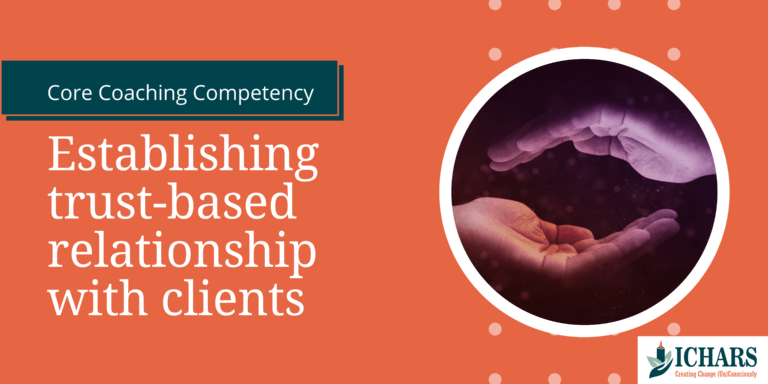Imagine a client walking into a therapist’s office for the first time, feeling vulnerable and unsure. The ability of the therapist to establish trust from that initial interaction can set the tone for the entire therapeutic journey.
As Carl Rogers once said, “The curious paradox is that when I accept myself just as I am, then I can change.” This acceptance, rooted in trust, is the bedrock of effective coaching and therapy.
In this article, we delve into the vital competency of building trust, providing actionable insights and strategies for professionals in the field.
The Essence of Trust Based Relationship in Coaching and Therapy

Trust is the invisible thread that binds the coach or therapist to their client, facilitating a shared pursuit of goals. It transcends the mere exchange of information, creating a safe, non-judgmental space where clients feel understood and valued.
This competency involves consistent reliability, empathy, transparency, and confidentiality. Grounded in theoretical approaches like Rogerian client-centered therapy and the therapeutic alliance model, trust is both an art and a science essential for client growth.
The Importance of Establishing a Trust Based Relationship
To understand what makes establishing a relationship that is trust-based so critical, we must first explore the objectives of a coach/therapist-client relationship. This relationship enables the coach and therapist to help the client set and achieve goals.
For this to happen, clients need to feel comfortable discussing their current situation, desired outcomes, strengths and weaknesses, past successes and failures, and the obstacles preventing progress. Such open discussions are only possible when the coach or the therapist creates a supportive environment built on mutual respect and trust.
Strategies for Building Trust Based Relationship

Building trust with clients demands deliberate actions and skills. Here are strategic steps to develop this critical competency:
- Authenticity and Congruence: Be genuine in your interactions. Clients are more likely to trust when they feel the coach or therapist is authentic.
- Active Listening Skills: Develop the ability to listen actively and empathetically, reflecting back what the client has said to confirm understanding.
- Consistency in Practice: Display consistent behaviour over time. Trust builds when clients see reliability in the coach’s or therapist’s character.
- Transparency in Methods and Processes: Clearly explain the coaching or therapy models and techniques used, demystifying the process for clients.
- Sensitive Handling of Confidentiality: Emphasize the safeguards in place to protect client confidentiality, and maintain these privacy boundaries consistently.
- Personal Integrity: Uphold high ethical standards in all aspects of practice.
- Self-awareness and Reflection: Engage in regular self-reflection and supervision to understand your impact on the coaching or therapy relationship.
Practical Applications: Bringing Trust into Practice
Theoretical understanding must translate into tangible actions. Here’s how to actively apply trust-building strategies:
- Initial Connection: Forge a strong initial rapport with genuine interest and empathy.
- Confidentiality Assurance: Clearly outline confidentiality policies from the start.
- Consistent Communication: Communicate reliably, ensuring clients feel supported.
- Client Autonomy: Involve clients in decision-making processes.
- Empathy and Validation: Validate clients’ experiences without judgment.
- Feedback Integration: Show responsiveness to client feedback.
Enhancing Trust with the Cognitive Hypnotic Coaching and Psychotherapy (CHCP) Framework
CHCP approach offers specific strategies to nurture trust. These include psychoeducation, integrative techniques, safety and relaxation methods, tailored interventions, continuous calibration, and rapport-building tools like mirroring and matching. These techniques enhance the coach’s and therapists ability to establish and maintain a trust-based relationship.
Cognitive Hypnotic Coaching and Psychotherapy is client-led, beginning with the belief that the client understands their life best. This model seamlessly integrates life coaching with cognitive, behavioural, and humanistic approaches from psychology, along with NLP, hypnosis, mindfulness, and metaphors. Such integration helps clients define their current reality, set outcomes, create action plans, and overcome both conscious and unconscious hindrances.
Unique Advantages of CHCP:
- Client’s Map of Reality: Coaches and therapists learn to follow the client’s perspective, which builds trust by respecting the client’s viewpoint.
- Rapid Rapport Building: Techniques like mirroring and matching quickly establish a connection.
- Content-Independent Tools: These allow clients to share as much or as little as they wish, making the process comfortable and non-intrusive.
The trust between coach/therapist and client begins even before formal sessions through pre-coaching meetings that clarify the process, dispel myths, and set clear expectations, making the client feel in charge and informed.
Navigating Challenges in Trust Building
Building a trust based relationship is not without its challenges. Here are common challenges and strategies to address them:
- Building Trust with Skeptical Clients: Foster an environment of acceptance and patience.
- Maintaining Trust During Difficult Conversations: Handle sensitive topics with empathy and transparency.
- Rebuilding Trust After Missteps: Address missteps directly, apologize sincerely, and discuss how to avoid future issues.
- Balancing Professional Distance with Empathy: Utilize balanced approaches to empathy without over-identifying with the client.
- Navigating Cultural Differences: Engage in cultural competency training and respect cultural norms.
Ethics: The Backbone of Trust
Ethical considerations are crucial for building and sustaining trust based relationships. Key practices include:
- Upholding Confidentiality: Treat all client communications with strict confidentiality.
- Transparency in Practice: Clarify methods and expected outcomes at the onset.
- Professional Boundaries: Maintain appropriate professional boundaries.
- Respect for Autonomy: Honor clients’ right to make their own choices.
- Cultural Sensitivity: Adapt your approach to be inclusive and respectful of diverse backgrounds.
- Handling Conflicts of Interest: Address potential conflicts of interest openly.
Conclusion

Cultivating trust in coaching or therapy hinges on ethical conduct, understanding clients, and adapting approaches. Trust fuels meaningful connections and progress, essential for success.
Incorporating Cognitive Hypnotic Coaching and Psychotherapy methods enhances trust-building through tailored tools and empathetic practices. Anticipating challenges and adhering to ethics are crucial.
Trust is ongoing and strengthens over time, fostering success. Prioritizing trust and continuous learning is vital for coaches and therapists, contributing to professional integrity and client effectiveness. Explore trust-building in coaching and therapy with the Practitioners course in Cognitive Hypnotic Coaching.

